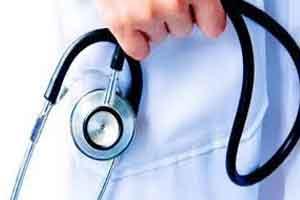- Home
- Medical news & Guidelines
- Anesthesiology
- Cardiology and CTVS
- Critical Care
- Dentistry
- Dermatology
- Diabetes and Endocrinology
- ENT
- Gastroenterology
- Medicine
- Nephrology
- Neurology
- Obstretics-Gynaecology
- Oncology
- Ophthalmology
- Orthopaedics
- Pediatrics-Neonatology
- Psychiatry
- Pulmonology
- Radiology
- Surgery
- Urology
- Laboratory Medicine
- Diet
- Nursing
- Paramedical
- Physiotherapy
- Health news
- Fact Check
- Bone Health Fact Check
- Brain Health Fact Check
- Cancer Related Fact Check
- Child Care Fact Check
- Dental and oral health fact check
- Diabetes and metabolic health fact check
- Diet and Nutrition Fact Check
- Eye and ENT Care Fact Check
- Fitness fact check
- Gut health fact check
- Heart health fact check
- Kidney health fact check
- Medical education fact check
- Men's health fact check
- Respiratory fact check
- Skin and hair care fact check
- Vaccine and Immunization fact check
- Women's health fact check
- AYUSH
- State News
- Andaman and Nicobar Islands
- Andhra Pradesh
- Arunachal Pradesh
- Assam
- Bihar
- Chandigarh
- Chattisgarh
- Dadra and Nagar Haveli
- Daman and Diu
- Delhi
- Goa
- Gujarat
- Haryana
- Himachal Pradesh
- Jammu & Kashmir
- Jharkhand
- Karnataka
- Kerala
- Ladakh
- Lakshadweep
- Madhya Pradesh
- Maharashtra
- Manipur
- Meghalaya
- Mizoram
- Nagaland
- Odisha
- Puducherry
- Punjab
- Rajasthan
- Sikkim
- Tamil Nadu
- Telangana
- Tripura
- Uttar Pradesh
- Uttrakhand
- West Bengal
- Medical Education
- Industry
Non-EU patients, including those from India, to be charged in UK

London: The UK government is preparing to introduce charges for non-EU national, including from countries like India, accessing doctor's services in the country.
It had been announced earlier this year that the government planned to charge for Accidents and Emergency (A&E) and ambulance care, but this has now been extended to some general practitioner (GP) services too.
"We want to make sure that everyone makes a fair contribution to services, by extending charging to make sure visitors pay for the care they receive," UK Health Secretary Jeremy Hunt said.
"This government was the first to introduce tough measures to clamp down on migrants accessing the NHS and these changes will recover up to 500 million pounds per year to put back into frontline patient care," he said.
Under the proposals, refugees and asylum seekers would be exempt from charges, and no-one would be denied emergency care at the point of need, the government said.
From April this year, non-European Union citizens settling in the UK for longer than six months are required to pay a "health surcharge" as part of their visa application - which, according to the UK Department of Health, has already produced 100 million pounds in savings.
The new proposed changes, expected to be enforced at the end of the consultation period in March 2016, would also see such patients charged for GP services such as blood tests, lung function tests, prescriptions, dental treatment and physiotherapy.
They would also have to pay for care received by paramedics, ambulance transport costs, and A&E services such as X-rays, setting broken bones, treating wounds, draining fluids and, when needed, intensive care.
The British Medical Association (BMA) has previously said doctors are meant to treat patients and "not to act as border guards".
"A doctor's duty is to treat the patient in front of them, not to act as border guards. Any plans to charge migrants and short-term visitors need to be practical, economic and efficient," a BMA spokesperson said.
Visitors from EU countries must present a European Health Insurance Card (EHIC) when using the NHS, so that the cost of their healthcare can be recouped from their government.
It had been announced earlier this year that the government planned to charge for Accidents and Emergency (A&E) and ambulance care, but this has now been extended to some general practitioner (GP) services too.
"We want to make sure that everyone makes a fair contribution to services, by extending charging to make sure visitors pay for the care they receive," UK Health Secretary Jeremy Hunt said.
"This government was the first to introduce tough measures to clamp down on migrants accessing the NHS and these changes will recover up to 500 million pounds per year to put back into frontline patient care," he said.
Under the proposals, refugees and asylum seekers would be exempt from charges, and no-one would be denied emergency care at the point of need, the government said.
From April this year, non-European Union citizens settling in the UK for longer than six months are required to pay a "health surcharge" as part of their visa application - which, according to the UK Department of Health, has already produced 100 million pounds in savings.
The new proposed changes, expected to be enforced at the end of the consultation period in March 2016, would also see such patients charged for GP services such as blood tests, lung function tests, prescriptions, dental treatment and physiotherapy.
They would also have to pay for care received by paramedics, ambulance transport costs, and A&E services such as X-rays, setting broken bones, treating wounds, draining fluids and, when needed, intensive care.
The British Medical Association (BMA) has previously said doctors are meant to treat patients and "not to act as border guards".
"A doctor's duty is to treat the patient in front of them, not to act as border guards. Any plans to charge migrants and short-term visitors need to be practical, economic and efficient," a BMA spokesperson said.
Visitors from EU countries must present a European Health Insurance Card (EHIC) when using the NHS, so that the cost of their healthcare can be recouped from their government.
Next Story


